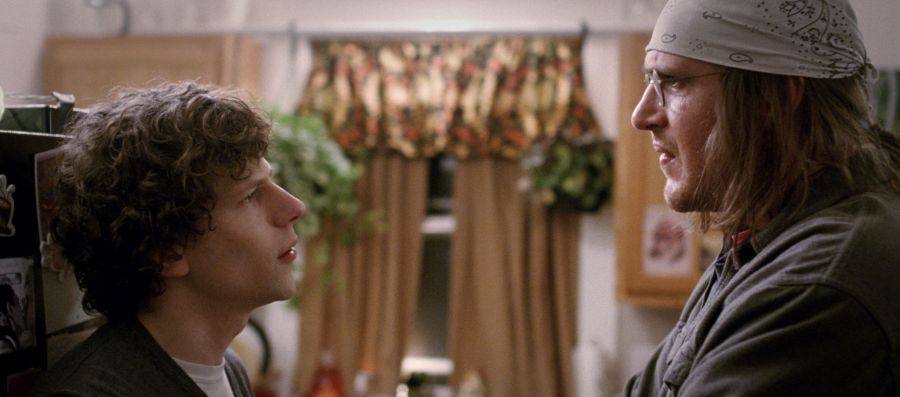A new biopic’s portrayal of author David Foster Wallace is winning praise from two of his former colleagues at Illinois State—even if the University itself is a little lost in translation.
The End of the Tour opened Friday in limited release to strong reviews, particularly for Jason Segel’s compelling turn as the late Wallace. The film chronicles Wallace’s revealing interview with a Rolling Stone reporter over several days at the end of his book tour for Infinite Jest. Wallace finished that acclaimed book while a professor in Illinois State’s Department of English, from 1993–2002.
Professor of English Robert McLaughlin taught alongside Wallace. He wasn’t expecting to like the film but appreciated its portrayal of Wallace’s conflicted feelings about his post-Infinite Jest fame.
“It’s respectful. It’s really smart,” said McLaughlin. “The people who made the movie know Wallace’s work well.”
Several scenes in The End of the Tour take place in Bloomington-Normal and at Illinois State, although the film was shot in Michigan. Grand Valley State University apparently played the part of ISU.

Jason Segel, right, as David Foster Wallace and Jesse Eisenberg as David Lipsky in The End of the Tour.
Notable Illinois State and Bloomington-Normal references in the film:
- When Rolling Stone reporter David Lipsky (portrayed by Jesse Eisenberg) asks his boss for approval to do the interview, he’s asked about Wallace’s whereabouts. “He teaches at a small state university somewhere in Illinois,” he replies.
- A Redbirds magnet appears on Wallace’s refrigerator in his south Bloomington home. A little Redbird football helmet also sits in his kitchen.
- Wallace is shown teaching students in a creative writing class—apparently intended to be Stevenson Hall—although it’s obviously a stand-in set.
- The characters drive past a “Bloomington-Normal: Next 2 interchanges” sign on the interstate. The Grand Rapids skyline, however, is a dead giveaway that this film was shot elsewhere.
- Normal’s Mitsubishi manufacturing plant and “cheesy Bloomington radio” get shoutouts.
McLaughlin was impressed by the film’s portrayal of Wallace, particularly his feelings about teaching. Segel’s Wallace talks about being uneasy shirking his classroom responsibilities for the book tour. When asked by Lipsky whether he likes teaching, he says, “I do, very much.”
“That was very like him,” McLaughlin said. “He was really interested in his students and was a very dedicated teacher.”
The film was screened in May at the Normal Theater during Illinois State’s 2nd annual David Foster Wallace Conference. Conference founder Jane Carman heard a lot of positive feedback from the 100+ attendees from around the world. She calls it a “must-see” for Wallace fans.
“I thought it was fantastic,” Carman said. “It still makes me think about the way we all portray and are perceived and portrayed. It makes me think about the struggle we all might have with writing and rewriting ourselves and our stories and the personas and stories of others.”
McLaughlin first saw the film at the conference.
“Jason Segel has done his homework,” McLaughlin said. “There were times he’d do certain vocal inflections or a shake of his head that caught my breath because it was just the way Wallace would say something. There were some moments that were just stunning.”
Illinois State University and the City of Bloomington are thanked in the end credits. Also receiving thanks are Professor Emeritus Charles Harris, who hired Wallace in 1993; his wife and Professor Emerita Victoria Frenkel Harris; and their daughter Kymberly Harris.
Wallace killed himself in 2008. His estate publicly came out against the film during production. McLaughlin wasn’t surprised.
“Oh God, he would’ve hated this,” he said.
Harris and Frenkel Harris had reservations too. The two felt a bit reassured during pre-production when director James Ponsoldt asked them for help getting a feel of what Wallace saw in his day-to-day life.
“I went to the screening of the film the first time with a bit of trepidation, even though I know the director to be an intellect who was bent on not exploiting Wallace,” Frenkel Harris said. “The second time I saw End of the Tour, I sat back and enjoyed the fabulous, moving portrayal.
“This is the best film, I believe, that could’ve been done,” Frenkel Harris added. “My hope is that the film will ignite more passion to go to Wallace’s incomparable writing. In this way, he—perhaps the best of his generation—will remain with us.”
The End of the Tour is now in limited release, showing at several theaters in Chicago. It will be shown at the Normal Theater over Homecoming weekend, playing October 23–25 at 7 p.m.
You can also make a gift to the Department of English’s David Foster Wallace Memorial Restricted Fund, or read more about Wallace’s connection to Illinois State:
- Professors recall David Foster Wallace’s Illinois State days
- Footnotes from Illinois State’s first David Foster Wallace conference
- Alum reviews David Foster Wallace biography Every Love Story Is a Ghost Story
Ryan Denham can be reached at rmdenha@IllinoisState.edu.


